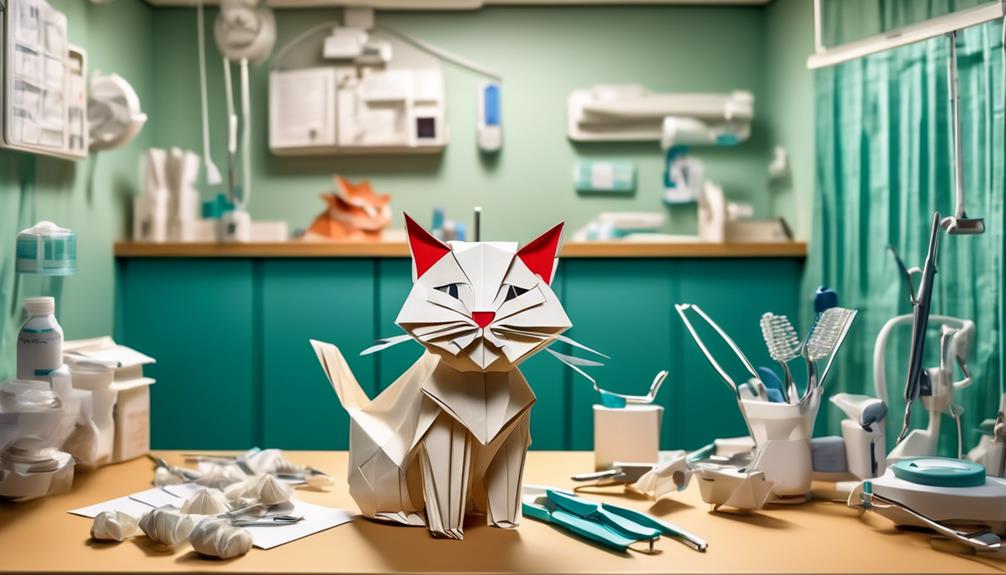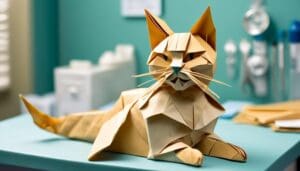Your older cat, who used to be very playful, now prefers to rest and stay close to you. You’ve noticed she doesn’t like to eat her usual food and her breath smells bad, which suggests a problem.
Dental care, often overlooked in older felines, is a cornerstone of their well-being, playing a pivotal role in not only preserving those precious purrs but also in preventing the cascade of complications that can arise from poor oral health. It’s an intricate dance of biology and care: as tartar builds up and gums become inflamed, the risks of periodontal disease, tooth resorption, and systemic effects on organs like the heart and kidneys climb.
Dental disease often progresses unnoticed in cats, but recognizing the subtle signs and implementing early interventions is crucial for your pet’s health and happiness in their senior years. Explore feline dental care to ensure your cat remains comfortable and vibrant.
Key Takeaways
- Dental diseases in older cats, such as swollen gums, bleeding gums, and bad breath, can lead to painful periodontal disease and tooth loss.
- Neglected teeth in older cats can also cause damage to vital organs and chronic discomfort.
- To maintain the oral health of older cats, establish a dental care routine, brush their teeth daily with cat-specific toothpaste, and add dental treats to their diet as preventive strategies.
- Treatment options for dental issues in older cats may include teeth cleaning, dental X-rays, tooth extractions, medication, and specialized treatments for tooth resorption and oral tumors.
Recognizing Dental Diseases
As your cat ages, it’s important to stay alert for any signs of dental disease, such as swollen gums or reluctance to eat, which could indicate a serious issue needing prompt care. Dental disease in cats is a common and often painful chronic condition that can lead to severe health problems if left untreated.
Periodontal disease is among the most prevalent concerns, characterized by red and swollen gums, bleeding, and bad breath. It’s not just about a dirty mouth; plaque and tartar build-up can severely affect your cat’s oral health, potentially leading to tooth loss. You might notice your cat showing signs of discomfort, pawing at their mouth, or having difficulty eating.
Another condition, Feline odontoclastic resorptive lesions, can be elusive but is no less distressing. Your cat may chew on one side of the mouth or show a sudden loss of appetite and weight. These are cries for help from a beloved pet suffering in silence.
Advanced dental issues might even manifest as oral tumors, with symptoms including drooling and facial swelling. It’s imperative to serve your cat with the same compassion they’ve always given you, ensuring their golden years are free from the shadows of dental disease.
Risks of Neglected Teeth
When we overlook our older cats’ dental health, we inadvertently set the stage for a silent struggle that can deeply affect their overall well-being and comfort. The risks of neglected teeth are profound and can lead to a cascade of health issues that go far beyond their mouth.
Consider these significant consequences of overlooking oral care:
- Painful periodontal disease may go unnoticed due to their stoic nature, leading to chronic discomfort.
- Tartar buildup can progress to gingivitis, causing red, swollen gums that make eating a painful experience.
- Neglected oral hygiene often results in tooth loss, which can severely impact their ability to nourish themselves.
- Untreated dental health issues can spread, potentially damaging vital organs like the heart and kidneys.
As caretakers, it’s our duty to ensure routine dental check-ups and procedures are a part of our older cats’ health regimen. Remember, by maintaining their oral care, you’re not just preventing dental problems; you’re safeguarding their happiness and longevity.
Let’s commit to brushing their teeth regularly and seeking professional dental health evaluations to spot and treat any dental health issue early on. After all, they rely on us to keep them purring contentedly into their golden years.
Preventive Dental Strategies
To prevent dental issues in older cats, it’s crucial to adopt preventive measures such as daily brushing with cat-specific toothpaste. This helps prevent plaque and tartar while strengthening their oral health.
Including dental treats in their diet, making sure they don’t exceed 10%, acts as a little plaque-fighting ally. These treats are specially designed to help scrape away the buildup that brushing alone might miss. It’s a simple yet effective gesture of love for their well-being.
Integrating water additives or oral washes into their hydration routine can play an important role. These solutions are tailored to combat bacteria and support gum health, offering an additional layer of preventive care that can make all the difference.
And don’t forget, regular vet visits for professional dental cleaning are indispensable. These check-ups can remove plaque that’s hardened into tartar and address early signs of gingivitis or periodontal disease. Each visit is a step toward ensuring your aging cat enjoys a pain-free, happy life with a bright and healthy smile.
Treatment Options Explored
While your cherished cat may not show it, dental diseases like gingivitis and periodontitis demand prompt and comprehensive treatment to restore their oral health and comfort. As a caregiver, you’re in the best position to ensure they receive the care they need.
Here’s a glimpse into the treatment options that could improve your cat’s dental health:
- Teeth Cleaning: Professional cleaning under anesthesia removes plaque and tartar, halting the progression of gingivitis and periodontal disease.
- Dental X-Rays: These are critical for assessing the extent of oral health issues and guiding the dental procedure.
- Tooth Extractions: Necessary for severe periodontal disease or tooth resorption to alleviate pain and prevent infection.
- Medication: Doctors may prescribe antibiotics and anti-inflammatories for stomatitis to combat infection and lessen inflammation.
Your cat’s oral examination will determine the specific course of action. Tooth resorption and oral tumors may require more specialized treatments, such as surgical extractions or crown amputations, and even radiation therapy.
Keep in mind, these procedures can be costly, but they’re an investment in your cat’s overall well-being. Remember, cat dental care isn’t just about maintaining oral health—it’s about nurturing a happy, pain-free life for your cat.
Daily Dental Care Tips
Taking care of your older cat’s dental health is crucial, and setting up a daily care routine can significantly improve their well-being. Regular oral care is essential to prevent disease and pain in cats. Incorporating daily dental tips into your routine will improve your cat’s oral hygiene and health.
It’s essential to brush your cat’s teeth regularly. This doesn’t have to be a struggle; with patience and positive reinforcement, it can become a bonding experience. Use dental treats as a tasty supplement to cleaning, but remember they’re an addition, not a replacement for brushing.
Here’s a table to guide you through a comprehensive daily dental care routine:
| Daily Task | Description | Frequency |
|---|---|---|
| Examine teeth and gums | Check for signs of plaque, tartar, or dental disease | Daily |
| Brush your cat’s teeth | Use cat-specific toothpaste and brush | Daily or twice-weekly |
| Dental treats | Offer treats that control plaque and tartar | As recommended |
| Dental sprays/diet | Utilize sprays or special diets to maintain oral health | As needed |
Frequently Asked Questions
Should I Get My Senior Cats Teeth Cleaned?
Yes, you should have your senior cat’s teeth cleaned to ensure their comfort and prevent health issues that could arise from neglected dental care, safeguarding their well-being as they age.
Is Dental Treatment Necessary for Cats?
Absolutely, dental treatment is necessary for cats. You’ll prevent pain and health issues, ensuring your cat lives a happier, healthier life. Regular check-ups and cleanings are acts of love and care.
Is It Common for Senior Cats to Lose Teeth?
Yes, it’s common for senior cats to lose teeth, which can impact their well-being. You’ll want to watch for signs of dental distress to keep your cat comfortable and healthy.
At What Age Do Cats Start Having Dental Problems?
Your beloved cat may start showing signs of dental distress as early as 3 years old, with issues like plaque and gingivitis creeping in silently but surely, signaling the dawn of oral health battles.




